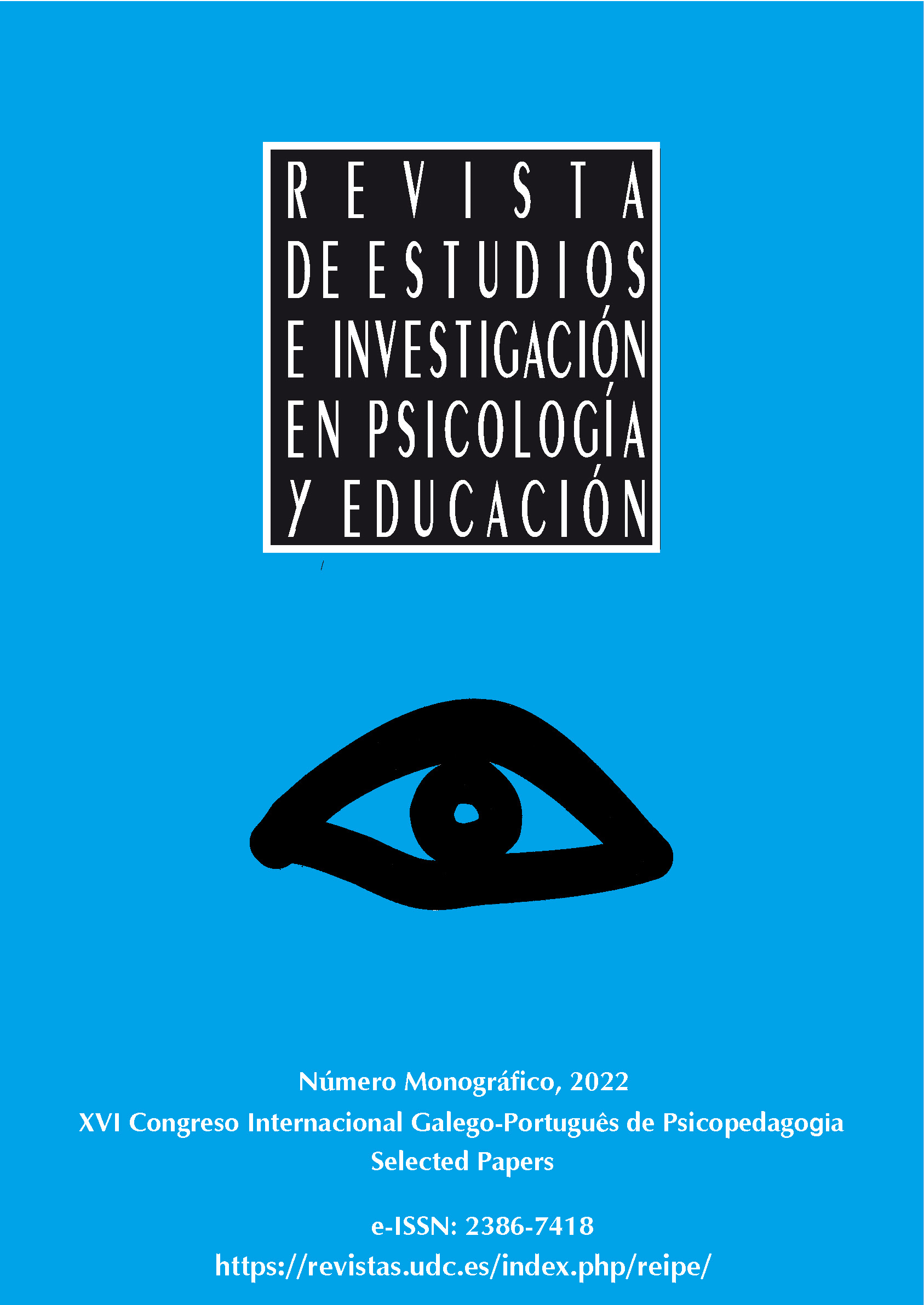Self-concept of university students
Main Article Content
Abstract
The aim of this study was to evaluate the relationship between self-concept of university students and academic variables to identify the dimensions affected in certain groups and, in future research, use the results as a framework to develop interventions that facilitate their transition to the professional sector. Students from both genders, different ages, faculties and educational levels of the University of A Coruña participated voluntarily (N = 512). The instrument used was a self-administered semantic differential-type scale, with 38 bipolar adjectives, including only the positive and negative poles, whose positive-negative/ right-left distribution was random. An Exploratory Factorial Analysis (EFA), carried out with a clinical sample, revealed the existence of five factors (Hedonic Well-being, Ethical and Occupational self-concept, Communication Skills and Emotional Adjustment), subsequently confirmed in this study through a Confirmatory Factorial Analysis (CFA). The results showed significant correlations between Occupational self-concept, sex and education level. Similarly, educational level correlates with Ethical self-concept, and sex correlates with Communication Skills. Additionally, the analysis revealed significantly higher scores in Occupational self-concept and Communication skills in males, while the highest Occupational self-concept was found in students enrolled in the Engineering and Architecture faculty. Significantly, higher scores in Ethical and Occupational self-concept were also found in Degree, as opposed to Master and PhD students. These results allow us to identify some of the key self-concept areas in the development of strategies to facilitate the work search, their insertion in the professional sector and, consequently, their life quality.
Keywords:
Downloads
Article Details
References
Fernández-Zabala, A., Goñi-Palacios, E., Rodríguez Fernández, A.; & Goñi-Grandmontagne, A. (2017). Diferencias de sexo y edad en el autoconcepto social. Universitas Psychologica, 16 (2), 1-10. http://doi.org/10.11144/Javeriana.upsy16-2.dsea
García, F., & Musitu, G. (2014). AF5: Autoconcepto Forma 5 (4ª ed.). Tea Ediciones
Gibson, D. (2003). Developing the professional self-concept:role model construals in early, middle and late career stages. Organization Science, 14 (5), 591-610. https://doi.org/10.1287/orsc.14.5.591.16767
Goñi-Palacios, E., & Fernández-Zabala, A. (2007). Los dominios social y personal del autoconcepto. Revista de Psicodidáctica, 12(2), 179-194. https://ojs.ehu.eus/index.php/psicodidactica/article/view/218
Goñi, E., Fernández-Zabala, A., e Infante, G. (2012). El autoconcepto personal: Diferencias asociadas a la edad y al sexo. Aula Abierta, 40(1), 39-50. https://dialnet.unirioja.es/servlet/articulo?codigo=3791853
La Rosa, J.; & Díaz-Loving, R. (1991). Evaluación del autoconcepto: una escala multidimensional. Revista Latinoamericana de Psicología, 23(1), 15-33.
Muralles-Vásquez, M.Y. (2018). Autoconcepto en jóvenes y adultos de 20 a 40 años de edad, alcohólicos que se encuentran en proceso de rehabilitación en el centro de rehabilitación asociación antigua. [Tesis de Grado, Universidad Rafael Landívar, Guatemala]. Disponible en: http://bibliod.url.edu.gt/F/YJD4D62UNYVU7DPPYH619KHVCL7SSP3VTIXVNRNIXMXMLS5NDB-53014?func=full-set-set&set_number=005545&set_entry=000064&format=999
Muthuri, R. N. D. K. & Arasa, J. N. (2017). Gender differences in self-concept among a sample of students of the United States International University in Africa. Annals of Behavioural Science, 3(2), 1-10.https://doi.org/10.21767/2471-7975.100029
Montoya-Londoño, D. M., Pinilla-Sepúlveda, V. E., & Dussán-Luberth, C. (2018). Caracterización del autoconcepto en una muestra de estudiantes universitarios de algunos programas de pregrado de la ciudad de Manizales. Psicogente, 21(39), 162-182. https://doi.org/10.17081/psico.21.39.2829
Nishikawa, S., Norlander, T., Fransson,P & Sundbom, E. (2007). A cross-cultural validation of adolescent self-concept in two cultures: Japan and Sweden. Social Behaviour and Personality, 35(2), 269-286. https://doi.org/10.2224/sbp.2007.35.2.269
Piers, E. V., Harris, D. B., Herzberg, D. S. (2002). The Piers-Harris Children's Self Concept Scale-Second Edition. Western Psychological Services.
Pinquart, M & Sorensen, S. (2001). Gender differences in self-concept and psychological well-being in old age: a meta-analysis. The Journals of Gerontology: Series B, 56(4), 195-213, https://doi.org/10.1093/geronb/56.4.P195
Rubie-Davies, C. M., & Lee, K. (2012). Self-concept of students in higher education: Are there differences by faculty and gender? Educational Studies, 39(1), 56-67. https://doi.org/10.1080/03055698.2012.671513
Shavelson, R. J., Hubner, J. J., y Stanton, J. C. (1976). Self concept: Validation of construct interpretations. Review of Educational Research, 46, 407-441. https://doi.org/10.3102/00346543046003407
Stake, J. E. (1992). Gender differences and similarities in self-concept within everyday life contexts. Psychology of Women Quarterly, 16 (3), 349-363. https://doi.org/10.1111/j.1471-6402.1992.tb00259.x
Vincent, M., Lagos-San Martín, N., González, C., Inglés, C. J., García-Fernández, J. M & Gomis, N. (2015). Diferencias de género y edad en autoconcepto en estudiantes adolescentes chilenos. Revista de Psicología, 24(1), 1-16. https://doi.org/10.5354/0719-0581.2015.36752
Willean, M. R. (2011). Sex and age differences across domains of self-concept among alternative school students. Disponible en: ProQuest Dissertations & Theses Global; Psychology Database. https://www.proquest.com/openview/1f4c24764f45f5a1f2b9ad6b38301fd0/1?pq-origsite=gscholar&cbl=18750
Yanicko, B. J. (1981). Sex-role self-concept and attitudes related to occupational daydreams and future fantasies of college women Journal of Vocational Behaviour, 19(3), 290-301. https://doi.org/10.1016/0001-8791(81)90064-6
Zhang, X., & Li, C. (2010). The study of University students´self-concept. International Education Studies, 3(1), 83-86. https://doi.org/10.5539/ies.v3n1p83



